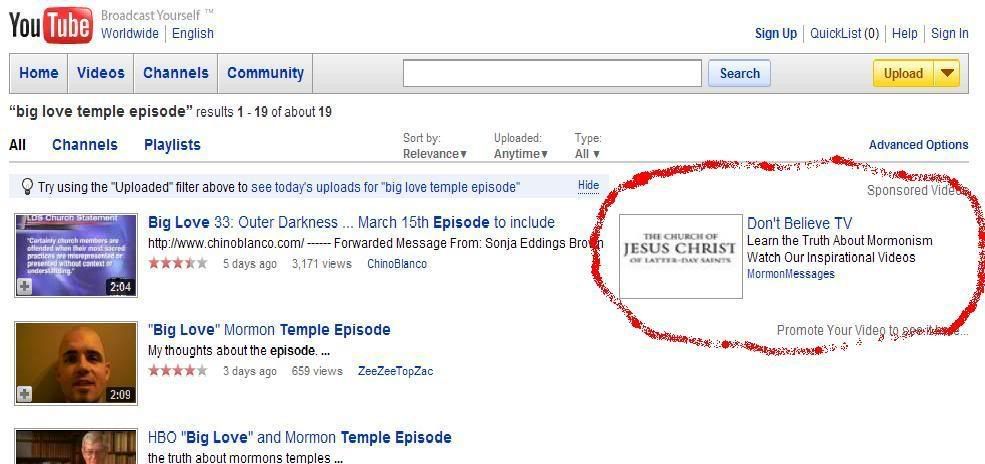Big Love = Big Traffic
As many of you know, I manage the media efforts for the Mormon Church, including Internet marketing. When we became aware of this series, it was recognized as an opportunity for us to tell the truth about Mormonism and Temples. Immediately I started a sponsored search campaign on YouTube, which sent visitors to our MormonTV channel ...Did anyone else notice the below Mormon-sponsored ad after a YouTube search for “Big Love” and “Temple”?

In context:

Which leads me to suspect that the earlier LDS Newsroom release was not about addressing the dilemma of publicity, but rather the opening salvo of an online campaign to draw even more attention to the church.
EXHIBIT A) Prop 8: The Social Media-savvy Side of a (Mormon) Campaign to Protect Marriage
EXHIBIT B) Big Love: LDS Media Talk: Response to the Why Mormons Build Temples Video
OBJECTION) Bill Paxton: Big Love is not TV:
REBUTTAL) Tom Hanks: No, it's definitely TV:
CLOSING ARGUMENT) Me: This is getting ridiculous.
You're all TV, got it?
And that includes all you churches that are spending your followers' dollars to ask me to watch your videos.
So, I agree with your calling it MormonTV: http://www.youtube.com/MormonTV ...
But I thought your ad told me not to believe TV?
Q.E.D.
And those who might disagree are always welcome to drop in (as they apparently already have):


But as long as you're dropping in, why not leave a comment?













6 comments:
Halliburton and the LDS? You Piker. We've had the DHS, the Treasury Department, Dept. of Justice, the House of Representatives, every branch of the military you can name and more. Get back when the real biggies come here. ;-)
Hey, I gotta start somewhere! :-)
Hey Chino Blanco, I hadn't really been following anything since the Prop 8 vote last year, but today I stumbled upon this entry going through some of my own blog's statistics... anyway, I'd just like to note something here, and I said as much in my post from last year, that it's really not accurate to label these social media efforts, either by individuals or the church, as "manipulative" when they are completely transparent. That's the whole point of the social media conversation - I can see everything you're doing, and you can see everything they're doing. If anything this transparency provides people the opportunity to make a decision as to how to react. There's nothing to hide and nothing manipulative is taking place. If an institution wants to pay to place an advert in a YouTube or Google search, they certainly can do so - why not?, and if someone wants to blog or use social media tools to campaign for a cause (like you yourself are doing here), they certainly can do that, too - again, why not?.
Once more, it's my opinion as a social media strategist that there is nothing manipulative about social media strategy. If persons which you disagree with are OPENLY discussing what they are up to on-line, even how they're up to it, then I fail to see what's manipulative in that. I welcome your response.
Hey Mattso,
People who take themselves too seriously are prone to do and say really silly things.
Latest example was this sentence of yours:
"Once more, it's my opinion as a social media strategist that there is nothing manipulative about social media strategy."
Isn't it kind of a foregone conclusion that a "social media strategist" like yourself would hold "social media strategy" in high regard?
In any case, you didn't really respond to the hilarity at the heart of my post. The LDS church is spending money to run online ads that say "Don't Believe TV" ... but these same ads direct their audience to a YouTube channel called, wait for it, MormonTV.
Ha!
Once more, it's my opinion as a blogger that my blogging skillz are unsurpassed.
Right, you should view your own skills in high regard. Isn't self-confidence paramount?
What I was trying to say was social media is inherently transparent. You can't expose something that's already in the open.
As for the irony of the ad and "MormonTV", well, I think that the definition of what constitutes television is really starting to change. We debated this in a course in my program this past summer - is a TV show still a "TV show" if you watch it on Hulu, for example? Probably, but the venue has changed. Still, nobody is going to call Hulu television just like no one is going to call television Hulu. Nevertheless, the lines are blurring. In any case, people still recognize the difference in delivery method, so, with all of that in mind, it's nothing significant for anyone to label their YouTube channel with "TV" as part of their name. I don't think most people would confuse "MormonTV" for actual television (despite the morphology of mediums taking place today). Moreover, I think most people would understand that the ad stating not to believe in what they've seen on television is in reference to actual over-the-air broadcast and cable TV, considering that the ad directs people to a web-based delivery platform.
This is just another exercise in semantics.
You're a real barrel of laughs.
Speaking of semantics, are you sure you've used "morphology" correctly?
Post a Comment